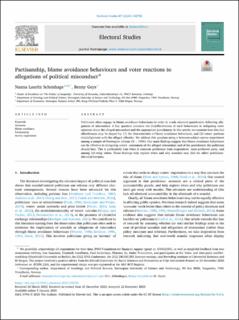Partisanship, Blame Avoidance Behaviours and Voter Reactions to Allegations of Political Misconduct
Journal article, Peer reviewed
Published version
Permanent lenke
https://hdl.handle.net/11250/3127174Utgivelsesdato
2024Metadata
Vis full innførselSamlinger
Originalversjon
Electoral Studies: an international journal on voting and electoral systems and strategy. 2024, 87 . 10.1016/j.electstud.2023.102742Sammendrag
Politicians often engage in blame avoidance behaviours in order to evade electoral punishment following allegations of misconduct. A key question concerns the (in)effectiveness of such behaviours in mitigating voter opinions about the alleged misconduct and the appropriate punishment. In this article, we examine how this (in)effectiveness may be shaped by: (1) the characteristics of blame avoidance behaviours, and (2) voters' partisan (mis)alignment with the alleged offender. We address this question using a between-subject survey experiment among a sample of Norwegian citizens (N = 1996). Our main findings suggest that blame avoidance behaviours can be effective in mitigating voters' assessment of the alleged misconduct and of the punishment the politician should face. This is particularly true when it concerns politicians from respondents' most-preferred party, and among left-wing voters. These findings help explain when and why scandals may (fail to) affect politicians’ electoral fortunes.

